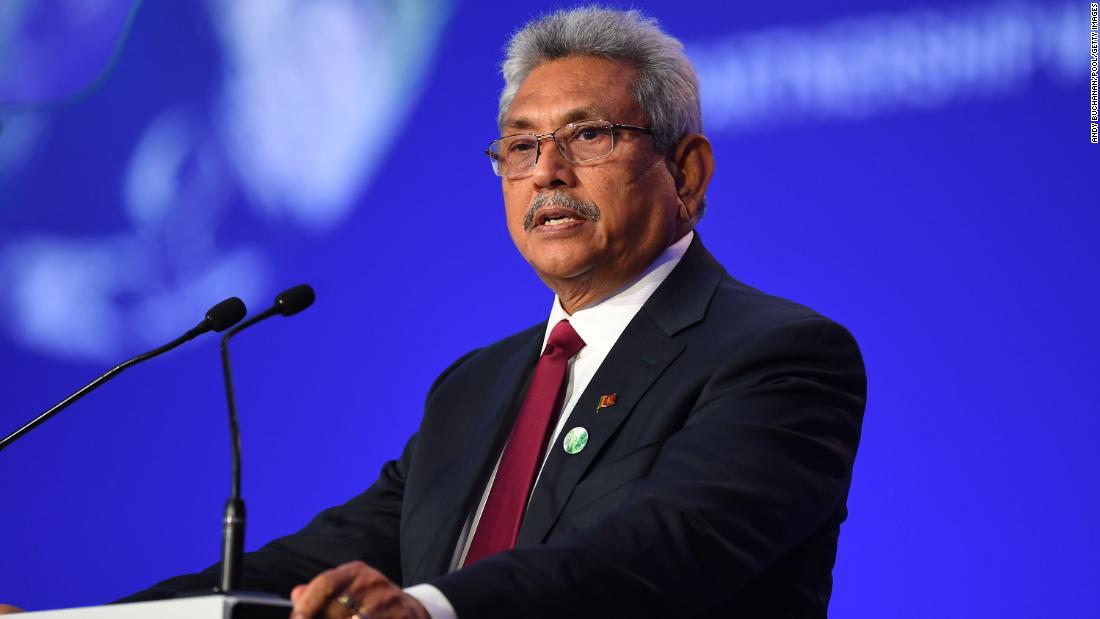Sri Lankan PM-appointed president calls for state of emergency as Rajapaksa flees to Maldives
Speaker of Parliament Mahinda Yapa Abeywardena confirmed the appointment in a televised speech on Wednesday.
Rajapaksa – who was due to step down on Wednesday but fled before officially doing so – made the appointment, citing a constitutional article that allows a prime minister to “discharge the powers, duties and functions of the office of president when the President is ill or “absent” from Sri Lanka.
Wickremesinghe was due to officially step down as prime minister on Wednesday “to make way for a multi-party government”.
The move came as Wickremesinghe’s office announced it planned to call a nationwide state of emergency, as protesters took to the streets of the commercial capital Colombo amid an economic crisis. marked by severe shortages of food, medicine and fuel.
He also ordered the Ministry of Defense to impose a curfew on Colombo and the rest of the country’s Western Province after police fired tear gas into the crowd outside the prime minister’s office, a source said. ministry official at CNN.
The official, who did not wish to be identified, said Wickremesinghe had ordered “unruly people and people traveling in trucks to be arrested”.
Rajapaksa and his wife flew to Male, Maldives, on a Sri Lankan Air Force AN32 troop carrier, according to a senior security official, shortly before his resignation .
Maldivian air traffic control refused the plane’s request to land until the Speaker of the Maldivian Parliament and former President Mohamed Nasheed intervened, according to the official. A Nasheed spokesperson neither confirmed nor denied the intervention.
The Sri Lankan Air Force confirmed Rajapaksa’s departure on Wednesday, saying in a statement: “In accordance with the request of the Government and in accordance with the powers vested in a President by the Constitution of Sri Lanka, the Sri Lankan Air Force Sri Lankan Air provided a plane early today to transport the President, his wife and two security officials to the Maldives.”
After he left, hundreds of protesters gathered outside the prime minister’s office in Colombo, chanting and demanding that neither the president nor the prime minister “be spared”.
Live video seen by CNN showed protesters marching towards the Prime Minister’s Office building, shouting as leaders tried to flee.
Police used tear gas to disperse a group of protesters trying to break through the barriers outside the building.
Rajapaksa aides arrived at Colombo airport on Monday with 15 passports belonging to the president and members of his family – including first lady Ioma Rajapaksa – who had booked seats on a Sri Lankan Airlines flight to Dubai from 6:25 p.m. local time, according to the military source.
But immigration officials refused to process passports given to them by presidential aides because Rajapaksa and his family were not physically present for cross-checks. Eventually, the flight departed without the president and his family on board, the source added.
Another attempt was made to board the family on an Etihad flight which was due to leave Colombo for Abu Dhabi at 9:20 p.m. local time, the source said, but the same problem occurred as the Rajapaksas refused to join the queue. public immigration hold for theft. .
In both cases, the Rajapaksa family were in a nearby airport lounge, awaiting confirmation that they could board without queuing among members of the public, the source said.
On Tuesday, a video released by a former police officer claimed that Rajapaksa was staying at a private house owned by a senior air force commander. The Sri Lankan Air Force has denied the claim, describing it as propaganda intended to tarnish the image of the corps and its leader.
Forced to resign
Rajapaksa’s planned resignation on Wednesday – which follows months of protests over the country’s crippling economic crisis – would leave him without presidential immunity and potentially exposed to a series of legal charges in the country.
Striking footage shared on social media showed protesters singing protest songs and chanting slogans calling for Rajapaksa’s resignation. Other photos showed groups of protesters setting up barbecue grills to grill food.
Reporting provided by journalist Rukshana Rizwie.


Comments are closed.